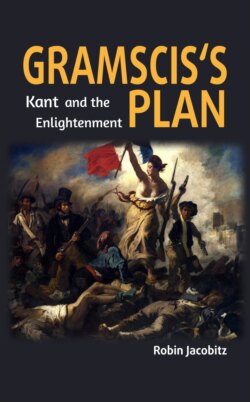Читать книгу Gramsci's Plan - Robin Jacobitz - Страница 7
На сайте Литреса книга снята с продажи.
ОглавлениеPreface to the English Edition
The German edition of Gramsci’s Plan – Kant and the Enlightenment 1500 to 1800 was published on January 7, 2021, the day after U.S. President-elect Trump encouraged his mob to storm the Capitol in Washington and disrupt the democratic process of transferring power. The Stop the Steal campaign, which lasted several months, reached its climax that day. These events demonstrate the fragility of parliamentary democracies even in nations where such events previously seemed unthinkable. Trump’s declaration of a state of emergency with a subsequent military coup in the U.S. would have been a historic disaster of incalculable proportions. The global offensive of nationalist, racist and anti-democratic forces that began in the last decade has been set back for now, but is far from over. The struggle for a democratic republic continues around the world, with new flashpoints being added every month, such as Myanmar after the military coup in early February 2021.
Gramsci’s Plan Volume 1 Kant and the Enlightenment 1500 to 1800 was written from the beginning with the intention of publishing an English version. The texts of classical German philosophy, especially those of Kant and Hegel, are poorly readable and often incomprehensible even to people whose native language is German. Translations often make this situation worse. The English version of Gramsci’s Plan – Kant and the Enlightenment 1500 to 1800 – enables anyone with a good command of English to become acquainted with Kant’s philosophy through selected quotations and the interpretations of Marx and Gramsci. In terms of content and language, the book is an attempt to reclaim philosophy for social life today and practical politics in the 21st century.
The German philosopher Immanuel Kant (1724-1804) is one of the most discussed philosophers worldwide. He is considered an exponent of the bourgeois Enlightenment. This is mostly described as a cultural trend that promoted the transition to modern society in feudal European society. The interpretations of Kant go in all directions and often come to nothing, which is shown, among other things, by the way, his “categorical imperative” is interpreted. So what does a preoccupation with Kant bring us people in the 21st century?
In “Gramsci’s Plan – Kant and the Enlightenment,” Kant is not classified – as in classical Marxism and Stalinism – as an exponent of “idealism.” For Gramsci, rather, he was the exponent of the rational law version within the broad spectrum of Enlightenment philosophy. Marx regarded Kant’s philosophy in this sense as the “German theory of the French Revolution.” Kant’s epistemology and ethics formed the basis for his political philosophy of the democratic republic. In accordance with his epistemology – the doctrine of the concept – and without religious or natural law ingredients, he founded the political philosophy of the democratic republic based on the reason of every citizen. The democratic republic is that form of government for which the American revolutionaries fought in the War of Independence from 1776 to 1783, the Jacobins in the French Revolution from 1789 and Marx in the German Revolution of 1848/9. For this reason, Kant formed for Gramsci the starting point of the Hegel-Marx line of philosophical development. The author firmly believes that Kant provided the best and still contemporary philosophical foundation for the worldwide struggle to establish, defend and expand democratic republics. To carry this thought into the world is the intention of the English edition.
Gramsci’s Plan is a long term project. Gramsci’s Plan is not backed by a publishing house or a political organization. The author is currently writing Gramsci’s Plan Volume 2 on “Hegel and the Dialectic”. My colleague Martin Stein has already supported me with ideas and suggestions during the last year. He will take over the maintenance and further development of the English website gramsci-plan.net.
The translation was done with the machine translation service deepl. com. A correction was made with two other spelling and grammar programs. After a hard struggle with English punctuation and since I had the pleasure to write a Master’s Thesis at the University of Albuquerque/USA in 1989, I am reasonably sure that my English is acceptable.
For better understanding, the titles of works by Kant, Hegel, Marx, and others have been translated into English in the text and footnotes. But, the references in the footnotes refer throughout to the German editions. The bibliography lists the German titles of the German editions. The selection and evaluation of English translations cannot be done by the author. At least the quotations of Gramsci are easy to find via the indications issue and paragraph. I hope that this hybrid solution will meet with the approval of the readers.
Robin Jacobitz, Juni 16, 2021
